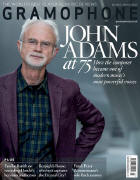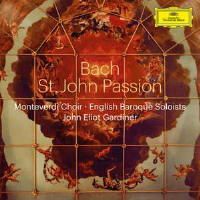Texte paru dans: / Appeared in: |
|
 |
Outil de traduction |
|
Reviewer: Jonathan Freeman-Attwood After 22 years, Deutsche Grammophon returns to one of its most prodigious prodigal sons from the label’s pre-millennial era. As John Eliot Gardiner’s great Bach Cantata Pilgrimage was completed almost entirely on his own label (after DG felt unable to commit to such an undertaking), so SDG ploughed a new furrow for the Monteverdis and another distinguished catalogue was reborn. One of those early successes was a recording of the St John at the Kaiserdom in Königslutter. By and large superior to the impressive but comparatively self-conscious 1986 account on Archiv, that reading contained another level of devotional intensity – perhaps still stirred in the resonating chambers of the Pilgrimage. As I mentioned at the time, both sadness and hope seemed to hover together tantalisingly. Charisma in communicating such a paradox is one of Gardiner’s great strengths and it returns in abundance here, experienced as a ‘one-off’ in the context of a socially distanced demi-semi-staged event (without audience) in Oxford’s Sheldonian Theatre on Good Friday 2021. From the start, we sense the roller coaster has been well oiled. The surging crowd is unstoppable – as Gardiner says, like the unruly mob in Washington that spring. For those watching on Blu-ray Disc, our minds return to Gardiner’s Monteverdi Vespers at St Mark’s, Venice (Archiv, 10/91, 5/03), where the work is reimagined for a unique stage and ritual. There we were offered different psalms from different galleries in the basilica. Here, Gardiner turns Christopher Wren’s ceremonial academic space into a courtroom, with the Evangelist pivoting to address all parties and Pilate looking down on the accused. The perspective is also brilliantly caught in the vivid audio-only option, only slightly undermined by a high-lying electronic ring heard between movements. While there is a predominance of young voices in the minor roles and the exceptional Monteverdi Choir, Gardiner’s dramatis personae are mainly seasoned Bachians. He gives them full rein to explore the most febrile and visceral aspects for their vocal delivery and dramatic imaginations. Nick Pritchard’s Evangelist is compelling: his story is rarely just observed but reacted to alertly and in the moment, often with deep foreboding. Peter Davoren’s ‘Ach, mein Sinn’ presents a desperate reflection on loss. William Thomas is as human a Jesus as you’ll hear, as each new plight presents itself. Each of the soloists takes centre stage with character and real courage: Alex Ashworth’s cultivated ‘Mein teurer Heiland’, a heartstopping ‘Zerfliesse’ from Julia Doyle, and Alexander Chance’s ringing and true ‘Es ist vollbracht’ – a fitting match for his father’s memorable account in Gardiner’s first recording. Throughout this powerful reading, one senses that Gardiner is also setting out his stall for a visual experience. And this is where this new recording needs to be taken entirely on its own terms. Don’t expect polish at every corner as one would a studio recording; both the deliberate and undeliberate rough edges are part of possibly the most incandescently fullblooded interpretation to date. Some may find it disturbingly extreme in its rapt physicality, super-rich inflections and emotional punch. It’s about as far from Herreweghe’s inwardly contemplative and madrigalian conceits of 2019 or Suzuki’s considered religiosity as you’ll get. Brace yourselves for an immersive Passion that takes no prisoners. |
|




